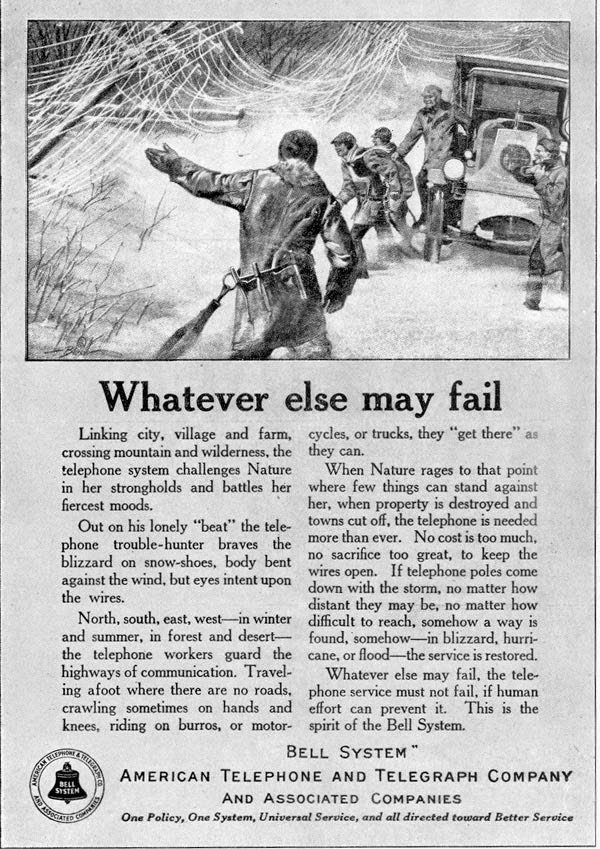The following was originally published in the 2016, Issue-2, of the CO/WY Retiree Guardian. It is published here with the permission of the author, Don Warsavage.
Don Warsavage’s ‘Person-to-Person’
Two mailmen died – Telephone lineman survived, repaired service.
When Royal Haulman, a retired telephone man died, his son Dennis went through his old papers. In his dad’s files, he found a newspaper clipping from Telluride, Colorado, with the headline, “Telephone line to Rico repaired Friday.”

Clipped to the article were eight yellowed pages of a diary describing that event, written and signed by Ray Hauser, who had worked with his dad.
After reading the remarkable story, Dennis thought it should be shared with other telephone people.
Dennis gave the newspaper clipping and his dad’s diary to his dad’s good friend and fellow retired telephone man, Ray Grummert, a member of AUSWR. Thanks to Ray Grummert for sharing this story.
Ray Grummert retired from U S WEST in 1992, as the Central Office Foreman in Boulder, Colorado. He remains a member of the CenturyLink Retirees.
A snowstorm overwhelmed the Colorado mountains, leaving Telluride and the smaller nearby towns of Ophir and Rico buried in drifts that reached the tops of the highway signs. Highway 145 from Telluride to Rico over Lizard Head Pass was closed. The storm knocked out the telephone service. An avalanche ruptured a flume running out of nearby Trout Lake, diverting water from the turbines generating power to the area, sending it flooding the slopes of Yellow Mountain, mixing with fallen snow.
Rico was an active mining town back then. Two mailmen perished in that brutal storm attempting to bring the mail, and a $3,000 payroll for the miners, to the snowbound community.
Ray Hauser and Telluride’s telephone exchange manager, Royal Haulman, set out in their telephone line truck to begin restoring service. A power company truck and a bull dozer clearing the highway joined them. After restoring service to Ophir, they reported in to an operator in Telluride and began a three-vehicle creep at a snail’s pace through 18 inches of snow, now mixed with flood water. The dozer and power crew had to move on, leaving Royal and Ray repairing a phone line for an isolated family who was so grateful for the restored service that they treated the two men to a turkey dinner.

It was evening by the time Royal and Ray snowshoed back to the truck in the sub-zero cold. They started the engine, but the truck would not budge. The water had frozen the wheels to the brakes. As Ray had it in the diary, “Two frozen repairmen and one frozen truck.”
Undaunted by cold, they took the rope that linemen call a handline, threaded it into the gas tank soaking the pieces with gasoline. They wrapped the shorter lengths around each brake drum and set them on fire. The four blazes melted the ice. They were able to drive back to Telluride.
The next day they became aware of the next daunting task awaiting them: to snowshoe up Lizard Head Pass (elevation 10,222 feet, the peak 13,119 feet), repair broken wires and move fallen trees. Then from Lizard Head (probably the next day), they would need to keep on doing the same for the 10 miles or so on down to Rico. An old railroad depot from the abandoned Rio Grande and Southern narrow gauge might serve as a shelter for the night. Lena Blix, the operator at Telluride, would handle their calls as they tested each segment of the line.

Royal and Ray took about a day to make it to the old depot on top of Lizard Head Pass. The depot was a wreck. Windows broken out, snowdrifts waist deep inside, a stove pushed off its stand with the stovepipe lying on the floor was their welcome. Pushing snow out the windows and doors, they made room for the night. After stuffing rags into the gaps left by broken windows and resetting the stove and stovepipe, they had a promise of beating the cold. They ripped lumber from a collapsed shed for fuel and started a fire in the old stove.

With a short dropline that they ran through a broken window, they could stay in touch with Lena during the night.
Ray Hauser showed his sense of humor about their situation quoting from his words: “Reservations were not in order at the Lizard Head Depot that night. All were welcome that cared to stay.”
They called in to describe their accommodations to Lena Blix. She became concerned that they would need food, so she called the local S & S Cafe in Telluride who made up several lunches. Oscar Blix (Lena’s husband?) put the food in a gunny sack, stuck a couple bottles of bourbon in his pockets and set out on the trail in that frozen moonlit night, volunteering to snowshoe up to Royal and Ray.
Two very grateful men ate that night. Later when they called the night operator, Mary McDonald, she reported that Oscar reached home safely.
Ray’s diary explains how uncomfortable and anxious they were in the smoky, freezing room of the old depot. It was still bitter cold. An old lamp with a wick containing some remnants of fuel created a strange kind of light, with a shimmering glow from the fire. They gathered more wood. They moved a bench closer to the stove. They needed to move around to keep warm.
They found an unusual device mounted on the log wall, a cone-shaped megaphone. It was used by the railroad in a primitive way to shout messages that could be heard on the receiving box at the next depot location.
In Ray’s words, “What we hollered into that cone is difficult to remember, but it fit the situation. It was given a few words each time one of us made a trip around the room.” They took turns yelling anything that came into their heads, not to send any message, but just coping with the cold and keeping warm.
The megaphone device was aided by batteries and a wire that ran on poles between depots. What neither of them knew was that somehow those batteries still had some life in them — and the railroad line had survived the storm. They also did not know that the connecting depot in Rico had been reconditioned into a residence. A family lived there. The husband was working the night shift in the mine, but his wife was home with the children. She suddenly heard these strange male voices coming out near her window.
Late that night, Royal and Ray heard a female voice in the room with them.
“’We’ve had it now,” thought Ray. In the freezing room, with strange flickering light reflecting through the smoke, every minute or so the female voice sounded but they couldn’t make out any words. It didn’t seem to come from any direction, it just filled the room. They went to the door and looked out at the frozen moonlit snow and saw no one. Their fright hit a new high.
Ray’s words from the diary, “If we ever had any courage, it was gone now.”
They thought about making a run for it back to the safety of their truck. Eventually they calmed each other down. They traced the sound back to that strange cone on the wall. They put their heads together near the cone and could actually make out the words she was saying. Through trial and error, they realized the woman was real and they could talk with her. The woman told them she had been very frightened by their voices. After they soothed each other’s fears and realized what was actually going on, she told them of the situation in Rico. She said she was totally isolated.
No telephone service, and the only other road out of Rico to Cortez was closed by the storm. She told them that two mailmen, a Mr. Stark and a Mr. Lewis, had died trying to bring the mail and the mine’s payroll. They had been found frozen in a sheltered snow cave they had made near town.
Ray and Royal explained to her they were telephone men on Lizard Head Pass on the way to Rico fixing the telephone lines as they went. The “phantom lady,” as Ray called her, asked if they had any way of reaching Cortez to report the two mailmen’s deaths. They called Mary MacDonald in Telluride, and she made a connection through Ouray and Durango to a Cortez Funeral home where they relayed the sad news from the woman in Rico about the dead mailmen.
As soon as it was light, Royal and Ray set out the next morning to repair the lines to Rico. Sunlight sparkled off the snow on Lizard Head Peak. When they called in to Telluride, they found out that Ken Karst, the District Plant Manager, had been notified of their plight and was sending help. The road from Cortez to Rico had been opened.
The temperature in Telluride was 22 degrees below zero.
At about midday, Royal and Ray ate the rest of the food Oscar Blix trekked up to them the night before. Everything was frozen solid. The oranges were like popsicles. But they could break the sandwiches into pieces and eat them anyway. By mid-afternoon, they spotted two telephone men working their way up. They met Cecil Higman and Gordon Jester at the site of an avalanche that had twisted the telephone wires around brush and trees and was partly buried in ice-hard snow.
The four-man team finished the repairs, restoring Rico’s telephone service to the outside world. The foursome trudged wearily into Rico just before sundown. At some point, they must have wondered at all the events they experienced in those three days.
In that summer of 1952, a couple named Inama bought the depot building on Lizard Head Pass. They moved it to Trout Lake, and refurbished it into a summer home. As Ray’s account concludes, “It is a striking difference now to view Trout Lake and Yellow Mountain as a guest of Mrs. Inama and have the mind’s eye cover the epic of The Lizard Head Pass Depot.”

Categories: Don Warsavage - Person to Person







